Participants' Bios
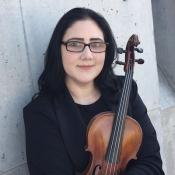
Alexandra Birch
Dr. Alexandra Birch has a diverse career as a violinist, violist and scholar. As a soloist and chamber musician, Miss Birch has toured extensively in the USA, Asia, Russia, and Europe in over 20 countries and is also a prizewinner in numerous national and international competitions. Dr. Birch holds a Bachelors (BM - Summa Cum Laude), Masters (MM), and Doctor of Musical Arts (DMA) from Arizona State University where she was a student of Dr. Katherine McLin. Equal in academics and performance, Dr. Birch's research focuses on music and the arts under duress particularly from the former USSR. As an Alexander Grass Memorial Fellow at the US Holocaust Memorial Museum, Dr. Birch released Soviet Memories (2019) and Musical Stolpersteine (2020): both albums feature recovered scores from her research in international archives alongside major classical sonatas. This is part of a larger research initiative examining the "deghettoization" of Holocaust music and its recognition in the broader classical canon. Dr. Birch is presently working on a monograph project investigating the use of music in war and genocide by the Third Reich. Her research interests situate around the rendering of trauma in cultural products, contested memory, double victimization, and the politics of memory and musical representation. She is currently a PhD student in musicology with Dr. Martha Sprigge at UC Santa Barbara.
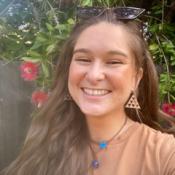
Alexyss McClellan-Ufugusuku
My name is Lex McClellan-Ufugusuku, I’m a third year Ph.D. student in the History Department at the University of California Santa Cruz. I am the policy team lead for the Okinawa Memories Initiative and have been the co-instructor for a course on conducting Oral History in Okinawa for our undergraduate researchers. As a teaching assistant I have been assigned a number of World War Two courses, and along with my advisor I designed, and subsequently TA’d for, His150E: History and Memory in the Ryukyu islands. As a mixed race Shimanchu, also known as Ryukyuan or Okinawan in English, my personal history and research are inextricably linked to the violent history of the Battle of Okinawa— which was staged on our island to abate an invasion of Japan, and led to the death of ⅓ of the Indigenous population. The history of this trauma is a delicate but central aspect to the course design, in addition to other traumas experienced by Indigenous peoples globally such as forced assimilation, and attacks on languages, cultures, and lifeways. To me, the search for humanity after atrocity is more than just teaching student (or even elders) about the events themselves, but also the legacies and ways in which atrocity still manifests itself years later in forms such as intergenerational group trauma. To be Shimanchu in a lot of ways is to be the product of many colonial, imperial, and war atrocities, however by remembering, truly remembering, those lost to such violent acts at least means their memory is not also destroyed, the challenge for me now is how to teach that.
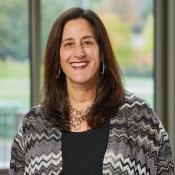
Amanda Smith Byron
Amanda Smith Byron is a social justice educator with over 30 years of experience working with diverse communities to heal trauma and transform conflict. Dr. Byron is an Associate Professor in Conflict Resolution at Portland State University, where she directs the Holocaust and Genocide Studies Project, coordinates the Holocaust and Genocide/Atrocity Prevention Graduate Certificate, and focuses her teaching and research on unsettling the role of identity in conflict, understanding enmification and hatred as root causes of violence, and developing peacebuilding strategies to prevent mass atrocities. Current research interests are focused on the restoration of dignity in the aftermath of atrocity, and the active role of imagination in possibilizing a welcoming future.
Benjamin Lapp
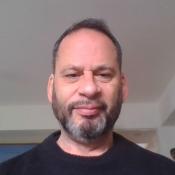
My name is Ben Lapp, Associate Professor of History at Montclair State University, New Jersey. I teach modern European history, specializing in 20th century Europe, the Nazi dictatorship and the Holocaust. While my dissertation and first book focused on the rise of Nazism in the Weimar Republic, my research now is related to the Holocaust. I am currently working on the oral testimonies of 5 German-Jewish women who formed a “camp family” during 2.5 years in concentration and slave labor camps from September 1942 until their liberation from Bergen Belsen on April 15, 1845. It is hard for me to generalize about “the search for humanity after atrocity.” The possibility of that search depends, I think, on the particular experiences of the survivor of atrocity and his/her psychic makeup. I would imagine there is a great deal of variation. Does “humanity” imply forgiveness or justice (or both?)
Brigitte Stepanov
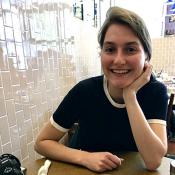
Brigitte Stepanov is an Andrew W. Mellon Postdoctoral Fellow with the Department of French and Arabic at Grinnell College. She will be starting as Assistant Professor of French and Francophone Studies at Georgia Tech on August 1st. She holds a PhD in French Studies (2020) from Brown University. Her dissertation, “In-Human: Visions of Cruelty in Twentieth and Twenty-First-Century French and Francophone Texts,” explored excessive forms of violence in warfare and their representation in fiction and visual media from Algeria, Rwanda, and France. Her book project in process continues to focus on representations of atrocities in French, Rwandan, and Maghrebi literature and cinema, arguing that the concept of cruelty is fundamental to any discussion of political instability, war, and crimes against humanity. This work more broadly examines the evolution of warfare over the last eighty years in addition to shifting conceptions of the human in the face of universal manifestations of violence, bringing to light the ways in which humans are compared to animals or monsters in the context of cruel acts. Studying such ontologies – and putting them into question – allows us to observe how the boundaries that define the category of the human change during war, why this is a problem, and what steps we might take to restore humanity after atrocity.
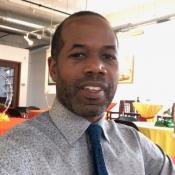
Clinton Nichols III
I see the search for humanity after atrocity as the intentional act of societies to embrace new ideas and patterned relationships that promote acknowledgement, accountability, and transformation towards a more just and sustainable social order. I think this effort is futile so long as we (as individuals, members of social groups, and our institutions) lack the bravery to imagine alternatives and attempt to turn these dreams into new everyday realities. My doctoral research considered the transformative potential of home-based enterprises in the squatter settlements of Windhoek, Namibia as a blueprint to change the post-apartheid city. I am beginning to research the struggles of black Windhoekers in the period after the German-Herero War (1904-1908) and before the formal imposition of apartheid. My teaching at Dominican University encourages my students to consider alternatives to our current approaches to crime, policing, and work. I look forward to developing a video presentation for this seminar; this format will stretch my skills and comfort level.
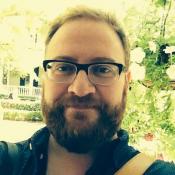
Corey Twitchell
Corey L. Twitchell is Assistant Professor of German at Southern Utah University, in Cedar City, Utah. He earned his PhD at Washington University in St. Louis in 2015, with a focus on German Jewish literature and culture, Holocaust studies, and Jewish studies. He has written on German-Jewish authors such as Jurek Becker, Wolfgang Hildesheimer, Ruth Klüger, Jakov Lind, and Fred Wander. His current book project explores questions of narrative causality in the fiction of Holocaust survivor and German-Jewish author Edgar Hilsenrath. His teaching and research interests also include German cinema and film theory, narrative theory, and contemporary literature of the Germanophone world. Corey also speaks and reads Yiddish.
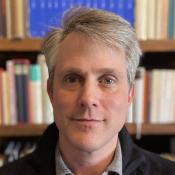
Daniel Magilow
Daniel H. Magilow is Professor of German in the Department of Modern Foreign Languages and Literatures at the University of Tennessee, Knoxville, where he is also an affiliated faculty member with the Cinema Studies Program and the Fern and Manfred Steinfeld Program in Jewish Studies. His research and teaching centers on photography and film and their intersections with Holocaust Studies, Weimar Germany, and postwar memory. Among other questions, his work examines what the breaks and continuities in perception and representation before and after genocide can tell us about humanity’s propensities for atrocity. Alongside many articles on memory, memorials, and photography, he is the author, co-author, editor, or translator of the following books: It Will Yet Be Heard: A Polish Rabbi's Witness of the Shoah and Survival (by Leon Thorne, edited by Daniel H. Magilow and Emanuel Thorne), Holocaust Representations in History: An Introduction (co-authored with Lisa Silverman, Bloomsbury, 2015, second edition in 2019), The Photography of Crisis: The Photo Essays of Weimar Germany (The Pennsylvania State University Press, 2012), Nazisploitation!: The Nazi Image in Low-Brow Culture and Cinema (co-edited with Elizabeth Bridges and Kristin T. Vander Lugt, Continuum Books, 2011) and In Her Father's Eyes: A Childhood Extinguished by the Holocaust (Rutgers University Press, 2008). Dr. Magilow was the Pearl Resnick Postdoctoral Fellow at the United States Holocaust Memorial Museum in 2005-2006.
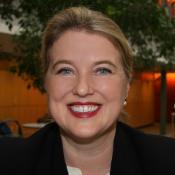
Elisa von Joeden-Forgey
Elisa von Joeden-Forgey is the Endowed Chair in Holocaust and Genocide Studies at Keene State College. Before this, she was the Marsha Raticoff Grossman Associate Professor of Holocaust and Genocide Studies at Stockton University in New Jersey, where she also directed the master’s program in Holocaust and Genocide Studies and founded the world’s first academic, graduate-level Genocide Prevention Certificate Program. She is former President of Genocide Watch, former First Vice President of the International Association of Genocide Scholars, and founder of the Iraq Project for Genocide Prevention (IPG). She received her MA and PhD in History from the University of Pennsylvania and her BA from Columbia University. She has received fellowships from the Social Science Research Council, the Ford Foundation, and the MacArthur Foundation. She has taught undergraduate and graduate courses on the Holocaust, comparative genocide, gender, sexual violence, war, human rights, imperialism, and genocide prevention at several universities and has lectured and published widely on these topics. Her most recent book is the edited volume, The Cultural History of Genocide, Vol. 5: The Era of Total War, forthcoming in 2021 from Bloomsbury Press.
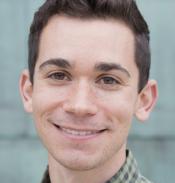
Golan Moskowitz
Golan Moskowitz is Assistant Professor of Jewish Studies and Catherine and Henry J. Gaisman Faculty Fellow at Tulane University, where he teaches undergraduate courses on "Holocaust in Film & Lit," "Sexuality in Jewish Culture," "Jews & American Pop Culture," and "Jewish Comics and Graphic Novels." He is the author of Wild Visionary: Maurice Sendak in Queer Jewish Context (Stanford University Press, 2020) and of several publications on intergenerational memory in post-Holocaust family narratives. Golan's MA thesis (2012) studied grandsons of Holocaust survivors through lenses of gender and queerness. His work has been supported by the Andrew W. Mellon Foundation, the Memorial Foundation for Jewish Culture, the Hadassah-Brandeis Institute, and the Tauber Institute for the Study of European Jewry. Golan is also a visual artist working on a graphic narrative about intergenerational memory in his own post-Holocaust family.
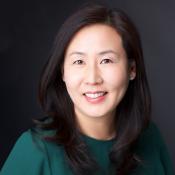
June Kim
Jungah Kim is Associate Professor of English at Borough of Manhattan Community College, The City University of New York (CUNY) and her teaching includes Asian American Literature, Postcolonial Literature, World Literature, and Literary Theory. Kim has written on postcolonialism, human rights, wartime atrocities, and the trauma narrative, including numerous articles published in journals as Postcolonial Text, Life Writing, and Law and Literature. She is currently at work on her book project about race, gender, and nation represented in the literatures of East Asian diasporas. In 2019, Kim served as chair of the 5th Annual BMCC Women’s Conference. She was appointed a sabbatical visiting scholar at the Center for Gender and Sexuality Law, Columbia Law School in 2019-2020. Kim’s view on “The Search for Humanity After Atrocity” begins with the burden of justice for the dead—or, a debt to the dead—especially when the face of justice is turned entirely toward the past. In summer 2021, Kim will be exploring the haunting effect of specters of “comfort women” represented in East Asian diaspora literatures and films as well as the problems of radical evil in the 20th century. Kim received her Ph.D. from Columbia University in 2010.
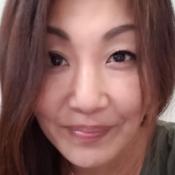
Kimiko Ichikawa
I currently belong to a Ph.D. program at the department of history of Jewish People and Contemporary Jewry at the Hebrew University of Jerusalem, Israel. My research topic is “Victims of the Holocaust and the Atomic Bombs in Japan: Victimhood and Victim-Perpetrator Relationships in Comparison,” where I compare the victimhood of each atrocity as a case study and mainly conduct an analytic research in victims’ testimonies. My research extensively relates with the content of NEH seminar searching for the humanity after atrocity. Joining the NEH seminar is a great aspiration to learn and pursue answers for a primal question; what is like to be a victim in atrocity and human rights of atrocity survivors.
Merose Hwang
Merose Hwang is an Associate Professor of History, Coordinator for the Asian Studies Minor and Peace Corps Prep Programs at Hiram College. She teaches courses on world history and Modern East Asia. Her publications have appeared in edited volumes Queer Korea (Duke UP, 2020), East Asian Motherhood: Politics and Practices (Demeter Press, 2014), and Asian Journal of Women’s Studies (2012). Her research interests are in the historiography of atrocities that were committed on the Korean peninsula after the Japanese occupation. She was a visiting scholar at the Institute for the Study of Religion, Sogang University, South Korea where she investigated the 4.3 Massacre memorial controversy on Cheju Island. From this experience, she firmly stands by the position that humanity is the essence of establishing and maintaining peace. Humanity is not just an aspiration; it is fundamental to human safety and survival.
Myra Houser
Myra Ann Houser is associate professor of history at Ouachita Baptist University where she teaches Africa-related courses and coordinates the school’s BA in social justice studies. She is the author of Bureaucrats of Liberation: Southern African and American Lawyers During the Apartheid Era (Leiden University Press, 2020), as well as various articles and chapters. As part of her research, she studies transitional societies, and within the social justice studies program often teaches on atrocity and trauma. During the seminar, she is hoping to learn more about how people process difficult lived experiences and how to more compassionately study and teach on them.

Ñusta Carranza Ko
Ñusta Carranza Ko is an Assistant Professor at the School of Public and International Affairs at the University of Baltimore. She teaches MA seminars on global affairs and human security and undergraduate courses on human rights, international politics, and research methods. She is the author of Truth, Justice, and Reparations in Peru, Uruguay, and South Korea: The Clash of Advocacy and Politics (Palgrave Macmillan 2021) and the co-author of Theories of International Relations and the Game of Thrones (Lexington Books 2019). Her current recent research project examines questions of Peru’s Indigenous peoples' women’s reproductive rights violations and how justice is regarded from the victims’ perspective. Given this focus on victims’ voices after atrocities, I am excited to learn about “the search for humanity after atrocity,” which may include questions of how humanity is perceived from victims’, how indigenous cultures may ground this vision, and where justice lies within this search process for humanity.
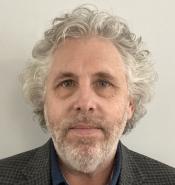
Thomas La Pointe
Thomas La Pointe is Associate Professor of Composition and Literature at Bergen Community College, New Jersey, where he also co-directed the Center for Peace, Justice and Reconciliation. He co-founded the Center for the Study of Genocide and Human Rights at Rutgers University, which now holds the UNESCO Chair in Genocide Prevention, and served as Director of Education. His research interests and professional activities have focused on the relationship of language to trauma, on the ways in which fictional and non-fictional narratives, giving voice to the search for humanity after atrocity, often re-enact, at the level of language, the very trauma they endeavor to describe. He has served as a visiting professor at the Shanghai International Studies University, China, as a researcher and writer at the Institute for Central American Studies, Costa Rica, and as an advisor on education and trauma to the Documentation Center of Cambodia, Phnom Penh. He was the co-principal investigator for a major grant award from the National Endowment for the Humanities, No Man’s Land: Dialogues on the Experience of War, and he received the John and Suanne Rouche Award for Excellence from the League for Innovation in the Community College Classroom. He is co-editor of Hidden Genocides: Power, Knowledge, Memory (Rutgers, 2014) and is currently at work on a book-length manuscript entitled Chasing the Dragon: Opium Smoking and the Invention of the Chinese American Alien.
Speakers' Bios
Bernard Offen
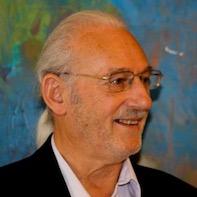
Love, Light and Courage is the story of Bernard Offen who, at the age of ten, endured the Krakow Ghetto and the Nazi concentration camps of Plaszow, Julag, Mauthausen, Auschwitz-Birkenau and Dachau-Kaufering. Out of over 50 in his family, only he and his two older brothers survived. In what Bernard would call his “process of healing”, he returned to Poland in 1981 to confront his demons. Not long after, he would begin his life’s mission of advocacy by spending summers in Krakow remembering, educating and inspiring others. Through his story, we bear witness to the unimaginable and are moved to face the ultimate question: How could this happen and what then must we do? Bernard is of the last generation to experience the Holocaust.
Carla Garapedian
Dr. Carla Garapedian is a filmmaker based in London. Her award-winning feature, Screamers followed the recurring problem of genocide in the last century. She has made films for the BBC and the UK’s Channel 4 about Afghanistan, Chechnya, North Korea, and Iran. The Los Angeles Times described her work with the headline “Documenting Truth in Dangerous Places.” She is the only American to anchor BBC World News. Working with the Armenian Film Foundation, she has digitized a rare collection of 400 Armenian Genocide survivor interviews filmed over four decades by the late J. Michael Hagopian. This archive is now part of the Visual History Archive at the USC Shoah Foundation. Carla earned her Ph.D. at the London School of Economics and Political Science and is a member of the Royal Institute of International Affairs.
Evi Blaikie
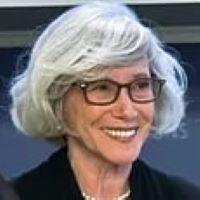
Evi Blaikie was born in Paris, France, to Hungarian Jewish parents. She was smuggled to Hungary when her parents were deported, where in 1944, when the Germans invaded, she went into hiding until liberated by the Soviet Army. Following liberation, and the disappearance of her father and most of her family, Evi returned to France, then immigrated to England where she lived in orphanages. She won a scholarship to the prestigious Saint Martin-in-the Field High School for girls. Following her graduation, she attended the University of Vienna, Austria where she studied languages and became an interpreter.
She worked for a year in Caracas, Venezuela, then came to the United States in 1960, where she married. She worked as a designer in New York's Garment industry for 25 years then switched to a career in the environmental field. In 1991, Evi founded a group called the Hungarian Hidden Children of NY, Inc. In 2003, she published her memoir, Magda's Daughter, followed in 2010 by, Remember Us, an anthology of short stories by Hidden Children. Her wartime experiences are shown in the just released documentary of the same name. She lives in NYC, teaches English to immigrants and writes. Evi has three children and five Grandchildren.
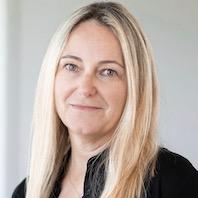
Karen Jungblut
Karen Jungblut, Director of Global Initiatives, oversees and manages a global portfolio of partnerships for the USC Shoah Foundation. With the Shoah Foundation since 1996, Karen has led an international and multilingual staff to successfully index the 50,000 video Holocaust survivor and witness testimony collection of the Visual History Archive. She led the expansion of the Archive to include testimonies of survivors and witnesses of other genocides and mass atrocities, including the 1994 genocide against the Tutsi in Rwanda.
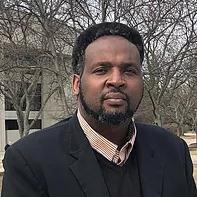
Kizito Kalima
Kizito D. Kalima was born on June 3, 1979, in Nyanza, Rwanda, to Denis and Cecilia Kalima. Kizito is the last born of ten and comes from a long family tradition of community involvement. His father was an administrator/teacher for local schools and his mother served as a health advisor to the surrounding community.
In 1994, the Kalima family was devastated by genocide. The family was separated, and many in the family, including Kizito’s parents, died. Kizito, however, managed to survive. Displaced by the genocide and without knowledge of surviving family members, Kizito found refuge in sports. He played basketball in surrounding African countries and was able to support himself in this manner.
In 1998, Kizito was offered the opportunity to travel to the United States to participate in a basketball tournament. Upon participating in this tournament, Kizito was scouted by many colleges in the US. Having not yet finished high school, Kizito was offered the opportunity to attend high school at Providence St. Mel High School in the Chicago area. Upon completion of high school, Kizito went on to attend Indiana University in South Bend, Indiana, graduating with a Bachelor’s degree in Criminal Justice in 2005.
Kizito is the Founder and Executive Director of the Peace Center for Forgiveness & Reconciliation, a public speaker, and an advocate for Genocide survivors. Kizito has spoken at a variety of schools, churches, community gatherings, and events. Perhaps the most notable and honorable speaking engagement to date occurred in 2014 when Kizito was invited to share his story at the United Nations 20th Commemoration of the Genocide in Rwanda.
Kizito lives in Indianapolis with his seven-year-old daughter, Kayza, and has two adopted and grown Rwandan daughters, themselves Genocide survivors, Josiane and Liliane.
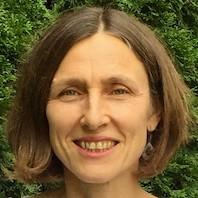
Marta Baziuk
Marta Baziuk is Executive Director of the Holodomor Research and Education Consortium (HREC), a project of the Canadian Institute of Ukrainian Studies, University of Alberta (Toronto office). HREC was founded in 2013 with the mandate to promote knowledge and awareness of the Holodomor through a range of research, education and outreach activities, engaging academic audiences, educators and the broader public. HREC initiatives include a publications program, annual research grants competition, visiting scholar and post-doctoral fellowships, conferences, and development of pedagogical materials.
Marta has more than 25 years of experience in international development and the not-for-profit sector. In the early 1990s, while representing the National Democratic Institute for International Affairs (NDI) in Ukraine, she worked with local activists to establish the first nationwide election monitoring organization, the Non-Partisan Committee of Voters. As Ukraine Program Officer for Winrock International, Marta oversaw the establishment of a national network of women’s centers that offer job skills training programs, domestic violence hotlines, and other services.
She holds a master’s degree in journalism from Columbia University.